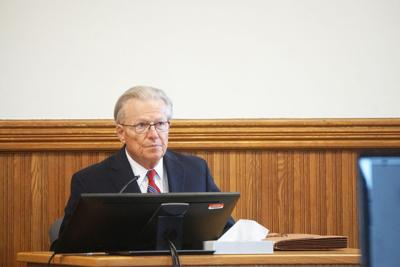Mark Sisti, in Belknap County Superior Court in Laconia on Friday afternoon, said the test to settle the question of insanity as a legal defense is unique in New Hampshire.
He and Amy Ashworth are defending Hassan Sapry, 27, in his second trial in the 2019 killing of Wilfred Guzman Sr. in Guzman Sr.'s Blueberry Lane apartment. Sapry has invoked the not guilty by reason of insanity defense which, in New Hampshire, is adjudicated by the jury, not psychological experts.
The legal question of insanity, in New Hampshire, is governed by the Durham test.
In the case Durham v. United States, a defendant had been discharged from the U.S. Navy in 1945, at the age of 17, after a psychiatric evaluation showed he was mentally unfit for service due to a personality disorder, according to a 1955 article in North Carolina Law Review from the University of North Carolina School of Law.
Over the next eight years, he attempted to harm himself, was convicted of stealing cars and passing bad checks, and was committed to mental institutions three times. Not long after his third release from an institution, he was caught breaking into a house, and again committed to an institution.
In February 1953, he stood trial in the U.S. District Court in the District of Columbia, charged with “housebreaking,” and raised the defense of insanity at the time the crime was committed.
Despite testimony from an expert witness opining numerous times the defendant was not of sound mind in committing the alleged crime, the trial court, without a jury, convicted him.
“The basis for the conviction was very simple: the expert witness would not testify to the fact that defendant did not 'know' 'the difference between right and wrong in connection with governing his own action,'” the article reads, in part.
In his own expert testimony, given in Belknap Superior Court on Friday during Sapry’s second trial, state’s witness Dr. Albert Drukteinis, a forensic psychiatrist, said it’s his opinion Sapry did know the “difference between right and wrong.”
But the ruling in the Durham case was reversed by an appeals court, which set out a new test by which mental responsibility should be determined, and sent the case back to the district to be retried.
In 1951, the Special Committee on Crime and Psychiatry of the North Carolina Bar Association made a recommendation: the legal test of insanity should be “extended to include diseases which destroy will power and volition and the capacity to control one’s conduct.” The new rule, to be applied in the retrial of the case in the district court, was such that “an accused is not criminally responsible if his unlawful act was the product of mental disease or mental defect.”
That, in essence, is the rule today in New Hampshire. A defendant — in this case, Sapry — holds the unique burden of proving, by a standard of clear and convincing evidence, that his actions in the killing of Guzman Sr. were the product of a mental disease or mental defect he was suffering at the time of the alleged crime.
While numerous states consider insanity a valid defense, and use other legal tests to determine insanity, New Hampshire is the only state which still uses the Durham Rule.
As Drukteinis said on Friday, “we’re talking about insanity, which is totally a jury issue, not a psychiatric issue.”


















(0) comments
Welcome to the discussion.
Log In
Keep it Clean. Please avoid obscene, vulgar, lewd, racist or sexually-oriented language.
PLEASE TURN OFF YOUR CAPS LOCK.
Don't Threaten. Threats of harming another person will not be tolerated.
Be Truthful. Don't knowingly lie about anyone or anything.
Be Nice. No racism, sexism or any sort of -ism that is degrading to another person.
Be Proactive. Use the 'Report' link on each comment to let us know of abusive posts.
Share with Us. We'd love to hear eyewitness accounts, the history behind an article.